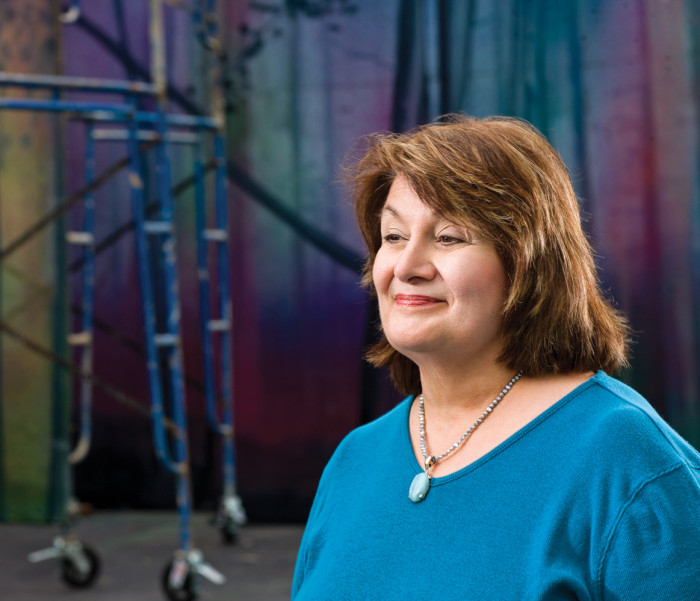“You seem like the type of person who would get things done.” Those words launched Ann Ciccolella’s career in the arts. Ciccolella, now the artistic director for Austin Shakespeare, was then a student at an all-girls catholic high school in her native New Jersey, and a nun had approached her about launching performances of Shakepeare at the school.
“So, at 15 years old, I read Julius Caesar and loved it,” Ciccolella said. She went on to help put on an outdoor production of the tragedy at the school.
Fast forward to present-day Austin, where Ciccolella is overseeing another outdoor Shakespearean production, A Midsummer Night’s Dream, in Zilker Park. The Sheffield Hillside theater in Zilker Park is one of three venues that Austin Shakespeare uses for productions, and its park location helps the group bring the bard to a wide audience each summer during Shakespeare in the Park performances. The summertime productions have grown over the years from audiences so small they would sit onstage with the actors to current crowds of more than 700.
One notable show staged at Zilker Park’s rock island in 1991 took place just as a thunderstorm bore down on the area. Ciccolella, who was directing that play – coincidentally, a production of A Midsummer Night’s Dream – remembers watching the lightning on the horizon all around the park and fearing that the cast, crew and audience would become one of CNN’s more grisly stories. The production wasn’t hit by lightning, but the show did end early. This year’s performances have been thankfully lightning free and have drawn enthusiastic crowds.
“You have people in the park together with all sorts of levels of education and all levels of income,” she said. “It’s such a great gift to give Austin, free Shakespeare for all ages.”
Austin Shakespeare’s mission is all about accessibility. The nonprofit aims to bring the bard’s works, as well as those of other playwrights, to the community through professional theater productions and education.
There’s also an education component, which brings Shakespeare into high school classrooms. In the Comal Independent School District, the group has performed for more than 4,000 students. Part of this component is a program called 20/20, which divides a class period for high school and middle school students between watching Shakespearean-trained actors perform scenes and allowing students to work with the actors to do their own performances. The organization also trains adult, professional actors.
While it’s best known for its performances and its “Shakespeare aloud,” a weekly reading group for anyone interested in reading and discussing his works, the organization also puts a lot of effort into productions by other playwrights. “Austin audiences are really interested in languages, and they love a good story and good characters,” Ciccolella said, recalling that recent performances of the Oscar Wilde comedy An Ideal Husband and Schiller’s Mary Stuart kept audiences on the edges of their seats. “That’s a great feeling, because you don’t know when you pick these things how it’s going to work.”
The key to picking productions, Ciccolella said, is finding something that inspires passion. And passion’s never been in short supply for her when it comes to the arts.
“There’s so much of Shakespeare that’s so great in different ways,” Ciccolella said. “Every play is a different world. Think about the fantastical world of The Tempest versus A Midsummer Night’s Dream; they’re worlds apart.”
Does she have a favorite Shakespeare production? It’s whatever she’s immersed in. She’s currently working on a production of The Tempest and said she has fallen in love with it.
Being a woman in her field has been more of a rarity than being an out lesbian. Ciccolella said she’s learned to make space for herself in the male-dominated enclave of playwrights and directors.
“You find a role for yourself, and you play that role,” she said.
Nor has she encountered struggles or limitations as a lesbian, although she has given a helping hand to others. Austin Shakespeare collaborates with Out Youth, which has brought its participants to see shows in the park. Ciccolella said what’s notable about Austin’s gay community is that it’s active without being obnoxious. “It’s not just about being gay, it’s about being a complete person in the community – it’s very inclusive,” she said. “like Austin, it’s very welcoming and not belligerent.”
The city’s arts community is also an inclusive one that’s starting to grow up a little bit, thanks to first-rate facilities such as the long center. Recalling the Austin she first met when she moved here in the 1980s, Ciccolella said that the theater community was comprised of “people who just wanted to do theater and were doing it. It didn’t matter if there was a place or not, people just made it happen. And Austin still has that feel to it.”
With the addition of the long center and an arts community-wide movement toward multiyear funding strategies, the city is coming into its own with the arts, according to her.
“There are lots of generous donors, but we’ve never really asked them about giving on an ongoing basis,” Ciccolella said. “That’s when you can really start to plan, and that’s a very mature arts community. That’s the next step.”
And maintaining a thriving arts community is vitally important to any city, she went on, because it adds an energy that draws people and businesses to the area. “It’s not just what I feel, it’s the facts,” Ciccolella said. “People will move to a city if it has a vibrant arts community, even if they’re not participating, because interesting people come to vibrant arts communities.”




































